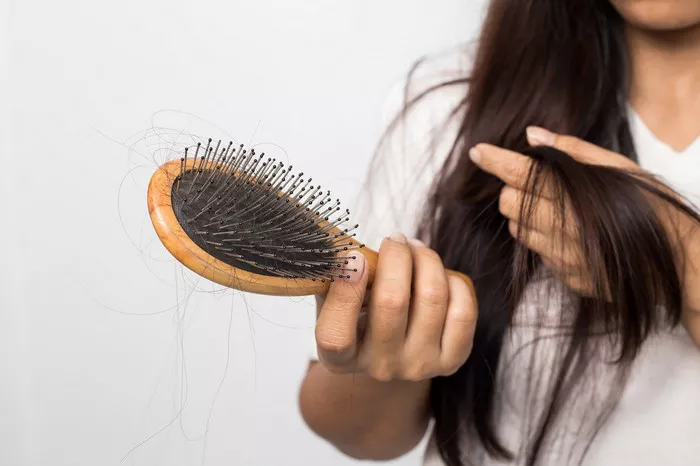The intricate relationship between vitamin levels and overall health has long been recognized, and emerging research suggests a potential link between low vitamin D levels and hair loss. In this article, we will delve into the scientific underpinnings of this connection, exploring the role of vitamin D in hair health and the implications of its deficiency on the hair growth cycle.
Understanding Vitamin D: A Crucial Player in Health
Vitamin D Basics:
Vitamin D, often referred to as the “sunshine vitamin,” is a fat-soluble vitamin essential for various bodily functions.
Its primary role is to facilitate the absorption of calcium and phosphorus for bone health.
Sources of Vitamin D:
The two main sources of vitamin D are sunlight exposure and dietary intake.
Sunlight triggers the synthesis of vitamin D in the skin, while dietary sources include fatty fish, fortified foods, and supplements.
The Role of Vitamin D in Hair Health
Hair Follicle Function:
Hair follicles, the tiny structures from which hair grows, have vitamin D receptors.
Vitamin D is believed to play a role in the hair growth cycle, influencing the activation and regulation of hair follicles.
Stimulating Hair Growth:
Adequate vitamin D levels are associated with the stimulation of hair follicles and the promotion of hair growth.
Research suggests that vitamin D may contribute to the production of new hair follicles, particularly during the anagen (growth) phase.
Low Vitamin D and Hair Loss: The Scientific Connection
Telogen Effluvium and Vitamin D:
Telogen effluvium, a type of hair loss characterized by excessive shedding, has been linked to low vitamin D levels.
The shift in the hair growth cycle towards increased shedding may be influenced by vitamin D deficiency.
Inflammatory Scalp Conditions:
Vitamin D is known for its anti-inflammatory properties.
Low vitamin D levels may contribute to inflammatory scalp conditions, potentially exacerbating hair loss in conditions like alopecia areata.
Risk Factors for Vitamin D Deficiency
Limited Sun Exposure:
Individuals with limited sun exposure, either due to geographic location, lifestyle choices, or cultural practices, are at an increased risk of vitamin D deficiency.
Sunscreen use and covering the skin may further limit the synthesis of vitamin D through sunlight.
Dietary Insufficiency:
A diet lacking in vitamin D-rich foods or low in nutritional diversity can contribute to insufficient vitamin D intake.
Vegan or vegetarian diets may pose a higher risk, as vitamin D is predominantly found in animal products.
Digestive Disorders:
Certain digestive disorders, such as celiac disease, inflammatory bowel diseases, or conditions affecting fat absorption, can hinder the absorption of vitamin D.
Individuals with these conditions may be more prone to vitamin D deficiency.
Diagnosing and Addressing Vitamin D Deficiency
Blood Tests for Vitamin D Levels:
Diagnosing vitamin D deficiency involves blood tests measuring serum 25-hydroxyvitamin D levels.
Healthcare professionals use these tests to determine if vitamin D supplementation is necessary.
Supplementation and Dietary Changes:
Vitamin D supplementation is a common approach to address deficiency.
Dietary changes, including incorporating vitamin D-rich foods or fortified products, can contribute to maintaining optimal levels.
Preventive Measures for Hair Health
Balanced Sun Exposure:
Balancing sun exposure while being mindful of sun protection measures is crucial.
Aim for moderate sun exposure on the face, arms, and legs to facilitate vitamin D synthesis without risking sun damage.
Dietary Diversity:
Ensure a well-rounded diet that includes sources of vitamin D, such as fatty fish, fortified dairy products, eggs, and mushrooms.
Consider supplementation under the guidance of a healthcare professional if dietary intake is insufficient.
Conclusion
In conclusion, the association between low vitamin D levels and hair loss underscores the importance of this vital nutrient in maintaining overall health, including hair health. Vitamin D’s role in stimulating hair follicles and influencing the hair growth cycle highlights its significance in preventing hair loss. Understanding the risk factors for vitamin D deficiency, diagnosing it through blood tests, and addressing it through supplementation or dietary changes contribute to both hair health and overall well-being. As always, consulting with healthcare professionals for personalized advice and monitoring is essential to ensure optimal vitamin D levels and promote healthy hair growth.

